Share This
Political Physics: Did Obama Flip or Flip-Flop?
/
A blogumn by Monique King-Viehland
Obama Declines Public Financing – Is he pulling a John Kerry?
 The public financing system for presidential elections was established by the Federal Election Campaign Act of 1971. It consists of three distinct components: partial public financing in the primary election; public funding of the presidential nominating conventions; and full public financing in the general election. The spending ceilings and amount of public grants are adjusted for inflation each new election cycle. Public funds to pay for the program are derived through a voluntary $3 checkoff on a taxpayer’s tax return, which costs the U.S. Treasury, not the taxpayer. Public financing was implemented to address concerns about the increasing influence special interest groups wielded in elections and to place nominees of the two major political parties on a more equal financial footing.
The public financing system for presidential elections was established by the Federal Election Campaign Act of 1971. It consists of three distinct components: partial public financing in the primary election; public funding of the presidential nominating conventions; and full public financing in the general election. The spending ceilings and amount of public grants are adjusted for inflation each new election cycle. Public funds to pay for the program are derived through a voluntary $3 checkoff on a taxpayer’s tax return, which costs the U.S. Treasury, not the taxpayer. Public financing was implemented to address concerns about the increasing influence special interest groups wielded in elections and to place nominees of the two major political parties on a more equal financial footing.
There have been a lot of discussions regarding Barack Obama’s decision to decline public financing. With his decision, Obama became the first candidate of a major party to decline public financing — and the spending limits that go with it — since the system was created in 1976, after the Watergate scandals. John McCain jumped all over Obama’s decision, noting in a visit to Iowa several months ago that “Senator Obama’s reversal on public financing is one of a number of reversals that he has taken.” Indeed, the media also concluded that Obama had “flip-flopped” because he had previously indicated that is he did become the Democratic nominee that he would pursue public financing if his Republican appointment did the same.
So, did Obama “flip flop” on public financing?
Maybe. But I think the more important question is did Obama have a choice?
Under the federal presidential financing system, a candidate this year would be given $84.1 million from the Treasury to finance a general election campaign. In exchange, the candidate is barred from accepting private donations, or from spending more than the $84.1 million. Moreover, those spending limits do not apply to the Democratic or Republican National Conventions.
So you’re thinking $84.1 million is a lot of money! Heck, I’ll take it. So that has to be enough money to run an adequate campaign right? Well, let’s do the math.
In 2004 presidential election, both George W. Bush and John Kerry spent nearly $300 million during the primaries. Moreover, officials of the Federal Election Commission and advisers to several campaigns say they anticipate that the McCain campaign will raise more than $500 million, including the funds raised by the Republican National Convention. And by the way, that $500 million estimate does not include spending by PAC’s and 527’s.
That would mean that Obama would need at least $500 million just to be “in this race.” And Obama is working hard to meet and exceed that goal.
According to the Los Angeles Times, Obama’s fundraising has set records for a presidential campaign. He has pulled in $454.8 million since entering the race in early 2007, compared with McCain’s $224.3 million. And he will need every penny, to go toe to toe with the McCain and the RNC.
In August, Obama spent $32.3 million on TV ads compared to McCain’s $18.1 million and the RNC’s $4.7 million. He spent $4 million on mail-related costs compared to McCain’s $8 million and the RNC’s $6.5 million. And he spent $650,000 on online ads and $884,000 on websites.
But I know what you’re thinking, how is it that McCain can remain competitive using the public financing system and Obama cannot. Three words: Republican National Committee. Typically, the RNC outraises the DNC, and this year was no different. By the end of June they had more than five times the amount of cash in the bank.
So, again, Obama has his work cut out for him and needs the flexibility associated with declining public financing to remain competitive.
As for me, one thing has become painfully obvious……
I can’t afford to run for President.
.






